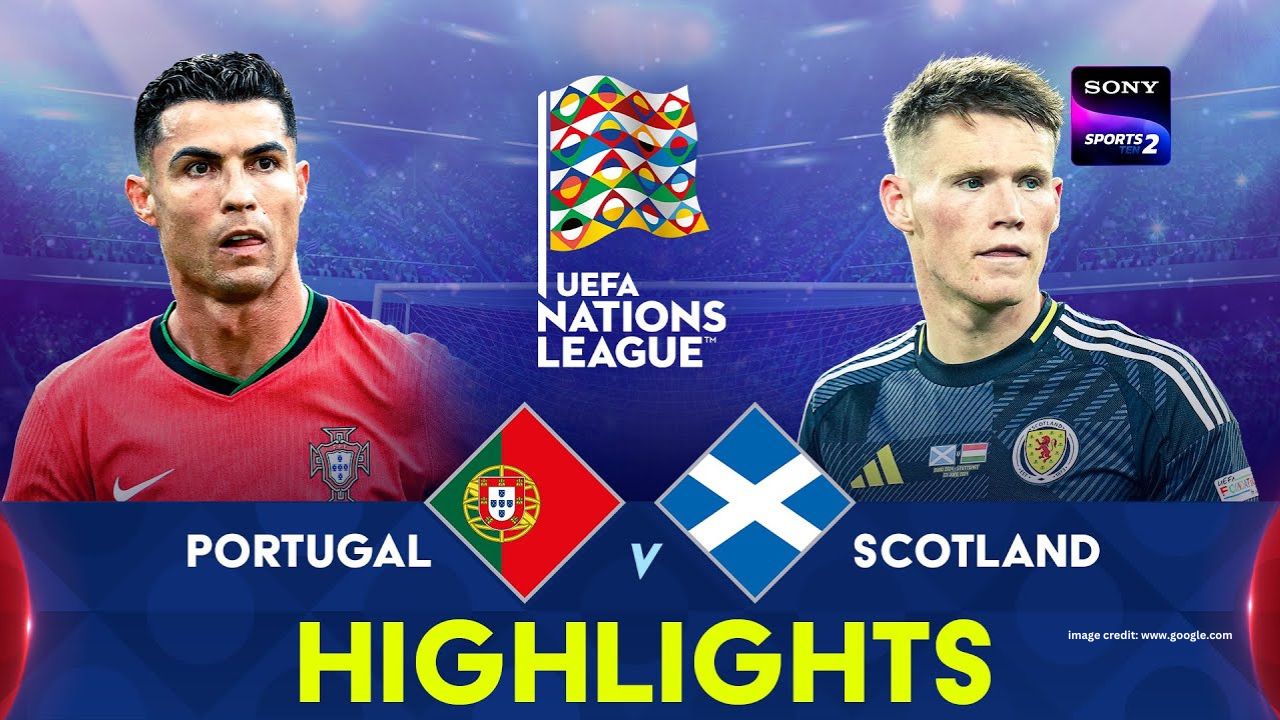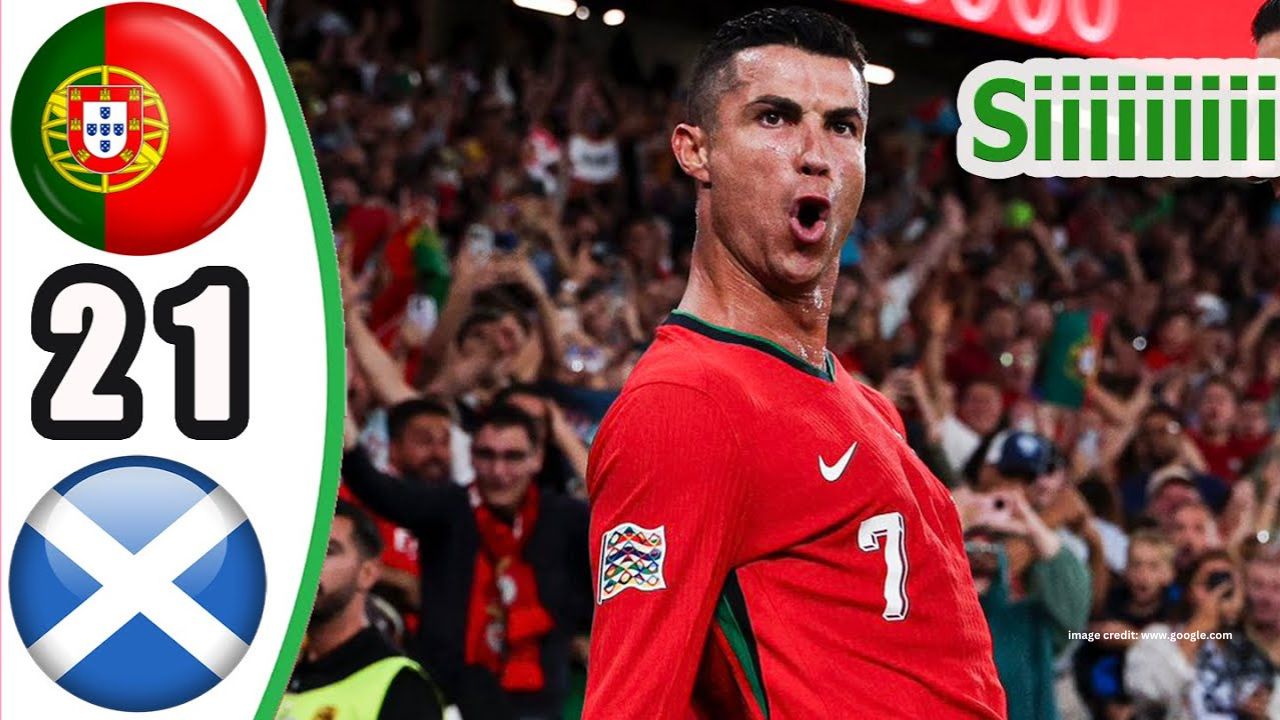portugal vs Scotland: In an exciting contest, Cristiano Ronaldo once again demonstrated his never-ending hunger for goals, surpassing Scott McTominay’s most recent valiant attempts for Scotland. Even if McTominay was playing well, Ronaldo stole the show with a performance that showed off his extraordinary longevity and competitive spirit. We analyze the match’s pivotal moments and more in-depth observations below.
Ronaldo’s Unstoppable Drive for Success
Cristiano Ronaldo demonstrated at the age of 39 that he is still a formidable opponent on the global scene. ( portugal vs Scotland) With a deft touch, he converted his 901st career goal, and celebrated as though it were his first. Throughout the game, his love for the game and his will to keep setting records were clear to see, especially in the ferocious manner he carried himself after the goal.
Ronaldo’s triumphant celebration, which included his trademark motion at the corner flag, represented more than simply happiness; it also signified his enduring significance and supremacy in the game of football. Ronaldo continues to be Portugal’s lucky charm even after leaving elite European club football to play in the Saudi Pro League. He consistently finds a way to make a decision when it matters most.
With Scotland leading 1-0 at the interval, coach Roberto Martinez brought him on, and the game’s dynamic changed instantly. Ronaldo struck both posts, let out a loud cry of frustration, and at one point he was even being pursued by a pitch invader. His ability to score goals and his unwavering quest of excellence indicate that he is far from done. Given his ferocity and drive, it doesn’t seem unlikely that Ronaldo will surpass 1,000 career goals, despite the doubts of many.
Scotland’s Defensive Struggles Persist
Ronaldo was brilliant, but Scotland’s defense was again porous. Ronaldo’s goals made Scotland the 48th international team to suffer as a result, but this was only one sign of a bigger problem for Steve Clarke’s team. The team’s defensive weaknesses have been made clear as they have given up five goals in their last two games.
Scotland has given up 33 goals in their last 14 games, with late goals being given up frequently. For instance, they have given up a goal after the 85th minute in five of their last six games. Both the previous loss to Poland and the match against Portugal demonstrated the defensive fragility. Scotland’s results are still plagued by their failure to stay focused, especially when faced with superior opposition.
Following the game, head coach Steve Clarke responded to these worries, stressing that Scotland must understand their current position in the growth cycle. Clarke has publicly stated that following a dismal Euro 2024 campaign, the team is rebuilding. His continued focus is on long-term development in order to get spots in prestigious competitions. Although there have been moments of offensive improvement as a result of his tactical changes—such as moving from a back five to a 4-2-3-1 formation—the defensive problems are still a major worry.
McTominay: Scotland’s New Talisman
In this game, Scott McTominay scored his 10th goal for Scotland in just 12 games, demonstrating his continuous development as a goal-scoring machine. Formerly a right-sided center-back for Scotland, the midfielder has developed into their most consistent goal threat in an advanced midfield position. Another example of his deadly presence in the final third was his header against Portugal.
His summertime move to Napoli from Manchester United has brought attention to his skills once again. He was frequently deployed in several midfield spots at United, which resulted in uneven performances. McTominay’s more aggressive role, though, has allowed Scotland to realize his full potential. His physical attributes, tactical acumen, and accurate finishing position him as a key member of Scotland’s attacking team.
Former Scotland striker James McFadden commended McTominay’s growth, pointing out that he seemed to have gained confidence after joining Napoli. Despite not being a traditional number 10, McTominay’s energy and shrewd movement allow him to locate gaps, which makes him a continuous threat to score. His contributions will be essential to Scotland’s preparation for the next World Cup qualifiers.
Clarke’s Evolutionary Approach
As he works to assemble a side that can contend at the greatest level, Steve Clarke’s Scotland team is going through an evolutionary rather than revolutionary period. His tactical changes, particularly the change in formation, indicate a readiness to modify and enhance the offensive powers of the squad. In keeping with his emphasis on youth and future development, Clarke has also added new players to the team, including Ryan Gauld, Ben Doak, and Tommy Conway.
Although McTominay has been a notable performer, Scotland’s overall results have been uneven, and the team is still working through alterations in their strategy. Clarke is facing a lot of obstacles because they have only won once in their last 14 games and have not won any competitive games in the previous year. With the World Cup qualifiers coming up, the coach is still dedicated to the long-term goal of making it to subsequent competitions.


